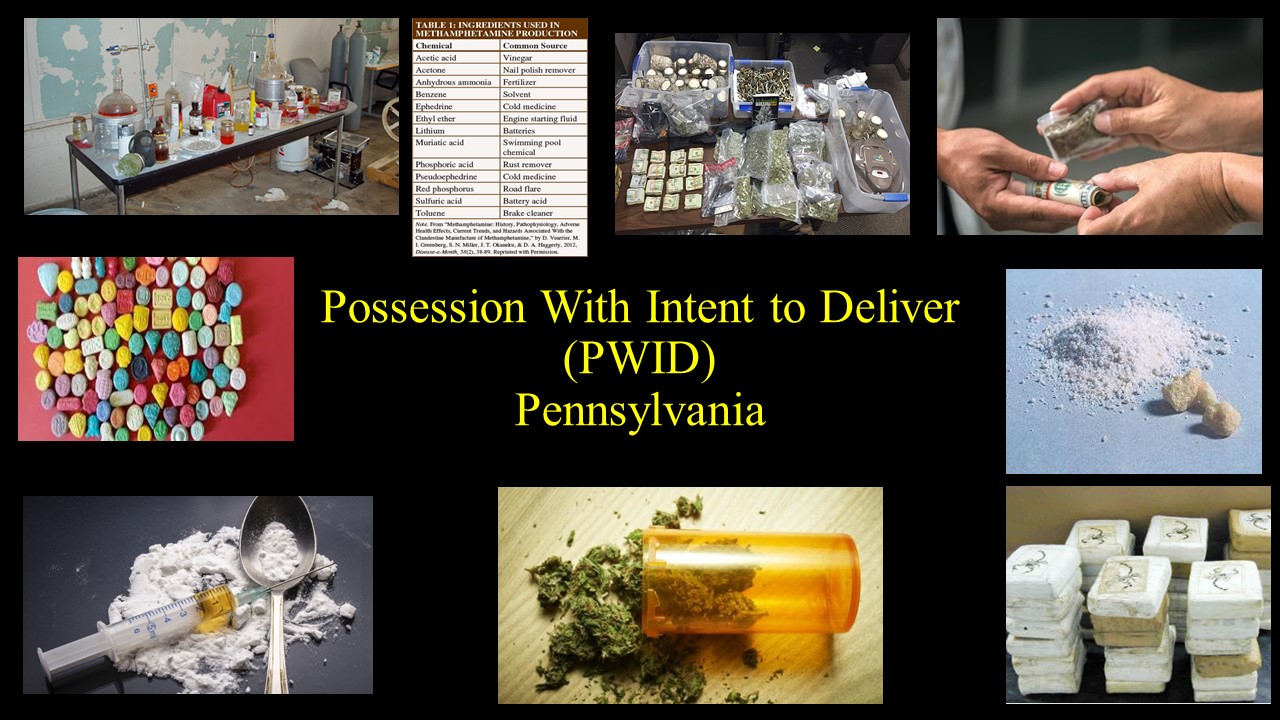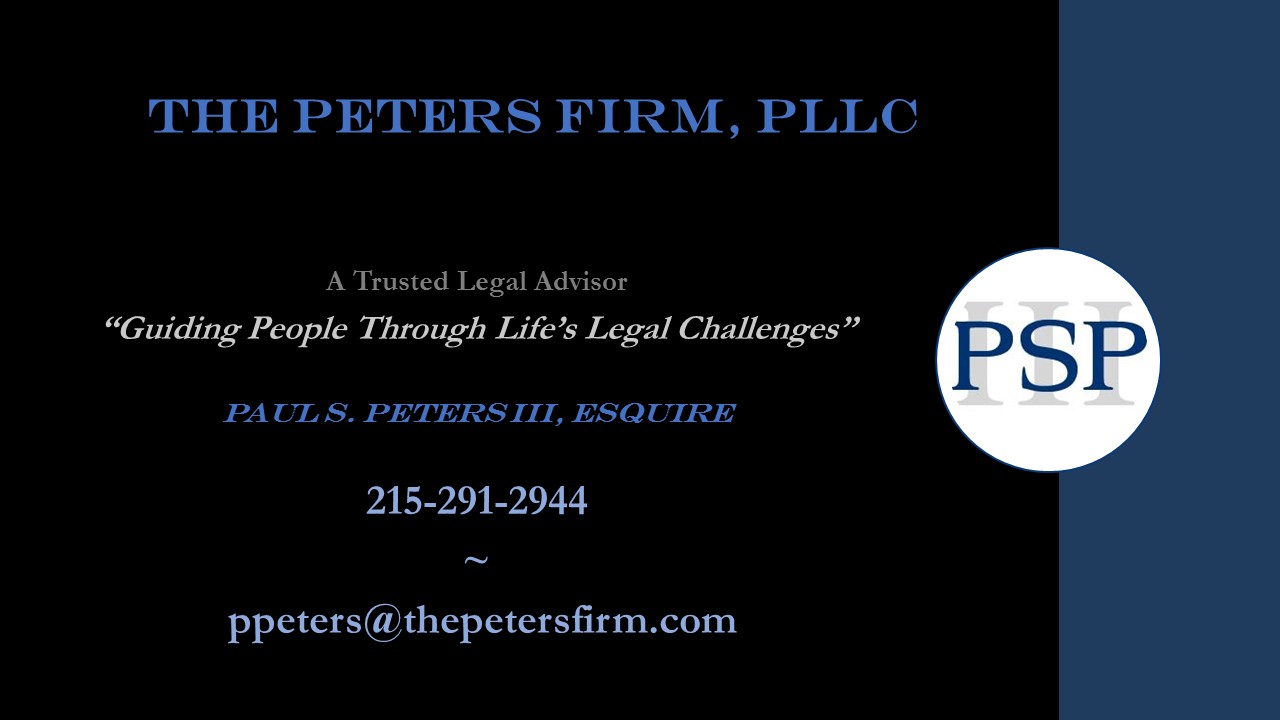
What if I am Arrested for
Possession With Intent to Deliver (PWID) in Pennsylvania?
Drug Possession and Delivery Laws in Pennsylvania (PWID)
In Pennsylvania, the main Drug Offenses are Possession With Intent to Deliver narcotics, Simple Possession of Narcotics, and Possession of Paraphernalia. Narcotics/Drugs are often referred to as “controlled substances”. PWID is probably the most frequently charged felony in Pennsylvania and its counties such as Montgomery, Philadelphia, Bucks, Delaware, Chester, Lehigh, Lancaster, Northampton, and Berks.
What is a Controlled Substance?
A controlled substance is any substance listed in the schedules designated by the Pennsylvania Secretary of Health or the United States Drug Enforcement Agency (DEA). Controlled substances are usually substances that have a likelihood of abuse. Each controlled substance is assigned to a schedule. There are 5 schedules. Schedule I drugs are rated for the highest potential for abuse and Schedule V drugs are rated for the lowest. The schedules are found in 35 P.S. §780–104 of Pennsylvania’s Controlled Substance Act. The schedules include narcotics such as, Marijuana/Cannabis, Powder Cocaine and Crack Cocaine, Heroin, LSD, PCP, Prescription Drugs, Methamphetamines aka Crystal Meth, Steroids, and designer drugs such as Ecstasy and Wet.
Pennsylvania’s 5 Schedules by level of seriousness are: (click on any of the listed drugs for specific information about the drug)
Schedule I drugs are rated for the highest potential for abuse and generally have no known medical use in the U.S.
- Heroin, Lysergic Acid Diethylamide LSD, Marijuana*, Methaqualone (aka Quaaludes), 3,4 Methylenedioxymethamphetamine (MDMA, Ecstasy, Molly), and Peyote.
*Marijuana being included in the highest Schedule given Pennsylvania has a Medical Marijuana Law is completely illogical and counterintuitive.
Schedule II drugs have a high potential for abuse, but they differ from Schedule I drugs in that they have a very limited currently accepted medical use in the U.S. or a currently accepted medical use with severe restrictions High potential to lead to severe psychological or physical dependence; generally considered dangerous.
- Morphine, PCP (aka Angel Dust), Cocaine, Methadone (opioid), Methamphetamine (aka Crystal Meth), Vicodin, Hydromorphone (Dilaudid), Meperidine (Demerol), Oxycodone (Oxycotin), Fentanyl, Dexedrine, Adderall, and Ritalin
Schedule III drugs are drugs with a moderate to low potential for physical and psychological dependence. Schedule III drugs abuse potential is less than Schedule I and Schedule II drugs but more than Schedule IV.
- Anabolic steroids, Codeine as used with other products such as Tylenol, Ketamine, Testosterone, and Hydrocodone with aspirin.
Schedule IV drugs have a low potential for abuse relative to the drugs previously listed
Schedule V drugs, substances, or chemicals are defined as drugs with lower potential for abuse than Schedule IV and consist of preparations containing limited quantities of certain narcotics. Schedule V drugs are generally used for antidiarrheal, antitussive, and analgesic purposes
- Cough preparations with less than 200 milligrams of codeine or per 100 milliliters (Robitussin AC), Lomotil, Motofen, Lyrica, and Parepectolin
Understanding how drugs are classified in Pennsylvania, along with the circumstances surrounding the alleged sale/possession, is vital to one’s defense. The seriousness of the drug(s) involved, the quantity of the drug(s) sold or possessed, and any additional circumstances (gun, violence, minor, school zone), significantly and gravely impact the punishment faced if convicted of a drug offense.
Simple Possession
Simple possession is knowingly or intentionally possessing a controlled substance by a person not licensed or registered to possess the said substance. A charge of “simple possession” under Pennsylvania law assumes that the drug(s) possessed were intended for personal use. This includes “street” drugs such as cocaine, heroin, LSD, and marijuana, or prescription drugs where the individual does not have a valid prescription or doctor’s order. 35 Pa. Stat. Ann. § 780-113(a)(16).
The crime of “simple possession” can pertain to any controlled or unlawfully possessed substance and is not limited by any amount, but it assumes that the substance(s) possessed are intended for personal consumption and not distribution.
Simple possession is an ungraded misdemeanor and if charged alone, may allow you entry into a drug diversion program or will likely be a sentence of probation.
Possession With Intent to Deliver
The prosecution must prove beyond a reasonable doubt:
- That you were in possession of drugs that are illegal or not from a medical prescription; and
- That you were distributing them or intended to distribute them and do not have a license to distribute the type of drug(s) possessed.
The prosecution must prove you were in either actual possession or constructive possession. Actual possession is when you have the drugs on your person, whereas constructive possession is when the drugs are not on your person, but under your control or easily accessible. For example, you could be charged with possession if the police find drugs in the trunk of your car or hidden under the couch cushions where you are sitting.
Possession With Intent to Deliver includes:
- Growing or cultivating drugs
- Manufacturing drugs
- Selling drugs
- Distributing drugs
Therefore, you can be charged with PWID for growing marijuana plants or operating a meth lab.
The two basic situations that result in a PWID charge are:
- The police observe you selling drugs or engaged in some activity that would suggest you intended to sell drugs. For example, they may have happened to see a corner drug deal when patrolling your street, they may have had you under surveillance for quite some time, they may see a large amount of people coming in and out of your home, or a confidential informant (CI) is used to purchase drugs with pre-recorded buy money.
- Second is you were in possession of drugs when stopped by the police, and they believe the drugs were not for personal use. In this situation, the police will typically rely upon two scenarios to support the charge:
- The quantity of drugs suggests that you intended to distribute them; and/or
- The drugs were packaged in a way that would suggest you intended to distribute them (the drugs were divided into equal portions and packaged in plastic baggies).
Regarding the amount of drugs in your possession, the District Attorney can create a presumption of intent to deliver by introducing evidence that the amount of drugs is not customary for personal use. In Pennsylvania, the minimum amounts that will allow for this inference are:
- 2 pounds of marijuana
- 2 grams of cocaine
- 5 grams of methamphetamine
- 1 gram of heroin
- 2 grams of other Schedule 1 or 2 narcotics
Examples of Paraphernalia or circumstances that can build the District Attorney’s case are Pre-Recorded Buy Money, presence of drug residue, needles, pipes, razor blades, scales, packaging method, a large sum of money, or guns.
Common Defenses to Possession with Intent to Deliver are:
(1) Motions to Suppress: If the police lacked reasonable suspicion or probable cause to stop, detain or arrest you, then the drugs or other contraband that was recovered must be suppressed and cannot be used against you in court.
(2) Argument over Actual vs. Constructive Possession: A common defense to PWID charges is the District Attorney cannot prove you were in actual or constructive possession of the drugs.
(3) Argument Against Conspiracy: Often police will arrest you even though you never touched drugs or interacted with any alleged buyers. The police justify these arrests after conducting a surveillance because they believe that the co-conspirator was either acting as a lookout, was responsible for the money on the corner, was re-upping the street with more drugs, or was otherwise involved in the drug enterprise.
(4) Arguing you were in Mere Possession: You can be charged with PWID because you are stopped in a vehicle for a traffic violation or you are in a home being searched and large quantities of drugs are recovered. Experts, defense witnesses, and pinpoint cross-examination can be used to prove the drugs were not possessed with intent to deliver.
Sentencing for Drug Offenses
A conviction for PWID, an ungraded felony, almost always calls for incarceration. The most important factors in determining the sentence for possession with intent to deliver are:
- the quantity of drugs recovered;
- whether there was a firearm present at the time of the offense;
- the location of sale or possession; and
- your prior criminal record pertaining to PWID
There are “mandatory minimum” sentences of state incarceration for PWID convictions if the weight of the drugs is over a certain amount, a gun is present, or the sale is within a certain distance of a school.
1-gram of heroin triggers a mandatory minimum sentence of 2-years of incarceration, 2-grams of crack or powder cocaine is a mandatory 1-year of state imprisonment, and 5-grams of PCP demands 3-years of incarceration. If you have a previous conviction for possession with intent to deliver or if the drug weight is higher, longer mandatory minimum jail sentences are required. A judge has no discretion to sentence you below these mandatory minimums. These mandatory minimums are controlled by 18 Pa. C.S. Section 7508; a complete list can be found here PA Drug Mandatories.
If you are convicted of PWID and there is a gun in your possession or near the drug activity, a mandatory sentence of five to ten years of state incarceration is required. This does not only apply when you are in physical possession of the firearm; the gun can be on a co-defendant, in a car or house where police execute a search warrant or chase a drug dealer or even found out on the street. If drugs are sold to minors there is a 1-year mandatory jail sentence, if sold within 1000 feet of a school it is a 2-year mandatory jail sentence, and if sold in a drug-free school zone it is a 2-year mandatory jail sentence. When the case involves 1000 feet from a school, defense attorneys typically request a remeasurement by the police, obtain their own expert to do the measurement, or use technology such as Google Maps to show the original measurement was flawed or incorrect.
Drug arrests in Pennsylvania create complicated fact scenarios with serious consequences if convicted, therefore, these cases require that you have an experienced, knowledgeable, and aggressive defense attorney to craft and present clear and convincing arguments challenging the evidence, and careful and precise cross-examination to shed doubt on the testimony of a witness. This is why you need a trusted and experienced criminal defense attorney such as Paul S. Peters III, Esquire.
If you or a loved one are faced with a serious drug offense such as Possession with Intent to Deliver, you can call Attorney Paul S. Peters III, Esquire 24 hours a day, 7 days a week, and he can appear at late night bail hearings. Attorney Paul S. Peters III, Esquire knows that crime and the police never sleep. If arrested for a drug offense
YOU BETTER CALL PAUL AT:
215-291-2944
ppeters@thepetersfirm.com
TRUSTED AND AGGRESSIVE PENNSYLVANIA
CRIMINAL DEFENSE ATTORNEY
If you have been arrested in Pennsylvania in any of the following counties, contact the trusted, aggressive, and experienced Montgomery, Philadelphia, Bucks, Delaware, Chester, Lehigh, Lancaster, Northampton, Berks, Adams, Cumberland, Dauphin, Franklin, Fulton, Huntington, Juniata, Lebanon, Mifflin, Perry, Snyder, York Bradford, Cameron, Centre, Clinton, Lycoming, Montour, Northumberland, Potter, Sullivan, Tioga, Union, Carbon, Columbia, Lackawanna, Luzerne, Monroe, Pike, Schuylkill, Susquehanna, Wayne, and Wyoming County Criminal Defense Attorney:
Paul S. Peters III, Esquire at:
215-291-2944
ppeters@thepetersfirm.com

Related Blog Posts
For additional information about some criminal law topics please click on the below blog posts:


